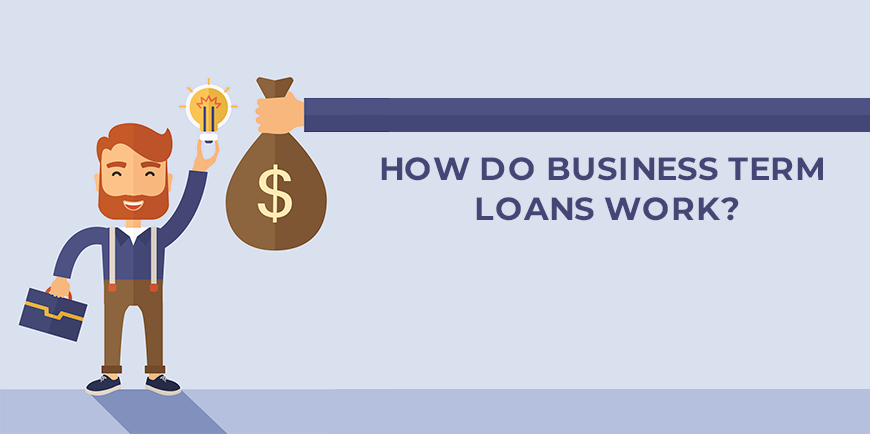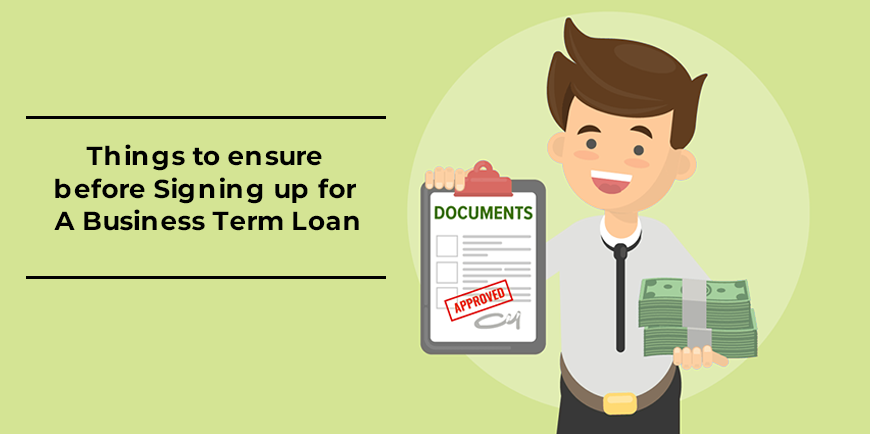Business Term Loans: A Must-Read Guide Before Applying

For Businesses and Entrepreneurs, there are a variety of options available to finance their projects. You can choose to go for traditional methods of business finance like business term loans, or you can go for the newer alternative sources of business finance like equity crowdfunding. You should weigh in all the factors affecting your business while choosing the source of business finance that is right for you.
In the complicated, competitive, and sometimes confusing world of business financing, term loans are a straightforward way of borrowing. If you are looking for a simple way to raise funds for your business, then you should consider going for Business Term loans. They are a hassle-free and quick way of obtaining funding for your business, irrespective of the purpose for which you need the funds.
In this guide, we will discuss everything that you should know about Business Term Loans before applying for one. This guide will give you a comprehensive understanding of Business Term Loans so that you can get the loan at the lowest cost and maximum returns.
TABLE OF CONTENTS
- What is a Term Loan?
- What is a Business Term Loan?
- How do Business Term Loans work?
- What are the Advantages of Business Term loans?
- What are the drawbacks of Business Term Loans?
- How to Apply for Business Term Loans?
- Answering a Few Common Questions on Business Term Loans
- Things to ensure before Signing up for a Business Term Loan
- Summary
What is a Term Loan?

Business Term Loans are a specific type of Term Loans, so it makes sense to understand Term loans first.
A Term Loan is a loan from a bank for a specific amount that has an established repayment schedule and either a fixed or a floating interest rate.
There are a lot of different types of Term Loans and if you’ve heard of car loans and home mortgages, then you know about at least one type of term loan.
Simply put, Term loans offer borrowers with funds that are to be repaid in full, along with interest, within the time limit specified by the loan agreement.
The word “Term” in “Term Loan” refers to the period of time in which you have to make the payments. So, Term Loans refers to a loan granted with a specified repayment period.
What is a Business Term Loan?
In common parlance, the term “Business Term Loan” is used synonymously with the term “Business Loan”. In Business Term Loans, the business owner borrows a lump sum amount from a lender, commits to make recurring payments, and agrees to repay the principal amount along with interest over a set period of time, or ‘term’.
Here we need to understand a few terms.
Firstly, ‘Principal’ refers to the money borrowed by the business as a loan that they have to pay back.
Secondly, ‘Interest’ refers to the amount that you have to pay as a charge on the loan. The Interest rate determines the amount of your monthly payments as well as the total amount that you will be paying back.
Business Term loans can have fixed or variable interest rates. A fixed-rate implies that the rate won’t change during the term whereas variable rate means that rates can fluctuate during the term.
Business Term Loans are generally used to finance the purchase of assets needed by the business, like land, equipment, and vehicle. They are also used for hiring additional employees, covering working capital needs, opening new business locations, and for such other purposes.
The precise repayment term is ascertained by the useful life of the underlying asset for which the loan is used. For example, a small piece of equipment like a copier or computer might require repayment in two to three years, whereas land and buildings are frequently offered terms ranging from 20 to 25 years.
You also need to secure these term loans with collateral. They are sometimes secured by the assets that they’re used to purchase. Although, there will most likely be some other conditions that apply as well.
How do Business Term Loans work?

Business Term Loans are much less complicated than other types of business financing like Merchant Cash Advance or Inventory Financing. They are provided by commercial banks, finance companies, and other non-banking financial institutions.
All Business Term Loans carry with them monthly payments, interest rates, and set terms. But, your interest could be fixed or floating (flexible). And, although your monthly payment might stay the same, the portion of it that goes towards payment of interest could fluctuate as well.
Let us understand how Business Term Loans work a bit more comprehensively.
Applying for a Business Term Loan
You can select the lender for taking a Business Term Loan based on how well you meet their borrowing requirements, your financing needs, and the conditions applied by the lender.
Let’s assume that you have made a loan application and your term loan has been approved. The lender shall now deliver the entire loan amount to you after deducting any processing fee that they might charge.
Interest Rates and Fees
In a Business term loan, you will be charged interest on the amount you borrow. The rate of interest depends on the current rate and the rate structure that you negotiate while applying.
The interest rates on loans depend on a variety of factors like:
- The Current Index Rate
- The perceived Credit Risk represented by your loan
- The length of the loan term
While most Business term loans have a fixed rate of interest, you may encounter one with a variable or floating interest rate. With a variable rate, your rate may increase or decrease over the term of the loan as underlying index rate changes. With this change in rate, your weekly, bi-monthly, or monthly payments also change. Fixed-rate Business term loans offer more predictability with your payments, which tends to be favorable.
Different lenders and different financial products carry different kinds of fees associated with them. This is why it is so important to prepare your loan documents carefully. Here are some types of fees to look for in your loan documents:
- Origination Fee: This is an upfront fee charged for processing a new loan.
- Processing Fee: These include other underwriting costs that the lender may pass on to the borrower.
- Documentation Fee: This is the fee for filing the loan application.
- Late Fee: The lender charges a Late Fee when your payment is not made on time.
- Broker’s Fee: This fee is charged by the broker or middleman who helps arrange the loan if you are not dealing directly with the lender.
- Other Fees: These can include guarantee fees, prepayment fees, closing fees, and more. Check your loan documents thoroughly to know about all such fees that you may be charged.
Repayment Terms
After receiving the loan amount, the process is quite straightforward. You have to repay the loan according to the payment schedule set by the lender, at the rate specified in your loan agreement.
You can also pay off the Business term loan ahead of schedule. This can be done by either increasing your monthly installments or by paying the outstanding balance in its entirety. But before doing this, you must always check with the lender if there will be any prepayment penalties for this.
Interest rates for Business term loans usually range from 6% to 15%. This is not a fixed range and it is possible to find Business term loans with higher or lower rates.
Business Term loan payments combine an amortization of the debt. This means that each loan payment you make covers the accrued interest on the loan and a portion of the loan balance. But you don’t necessarily pay equal parts of interest and principal from month to month. Instead, lenders usually stack interest payments early on and leave your principal payments for later on in the life of your small business term loan. In this way, even if you pay off your loan early to get the remaining interest forgiven, you have still paid most of it to the lender.
Term loans also usually come with fees that are set when you are granted the loan. You can pay such fees upfront or add it to the loan balance. Be sure to ask your lender about this during the application process.
In most cases, lenders require that you insure the assets you’re buying with the loan. In case you fail to make payments on the insurance or taxes on the assets, your lender has the option to advance these payments to protect their collateral. They may add these costs to your loan balance with interest.
Loan Amount
Borrowing amounts for Business term loans are fixed by individual lenders. You may find term loans as low as $25,000 or as high as $5 million or even more. The most common principal range for term loans offered by online lenders is usually somewhere between $25,000 and $1,000,000.
What are the Advantages of Business Term loans?

Here are the primary reasons why Business term loans are a popular mode of finance for businesses of all sizes:
- Lower Interest Rates:Business term loans are typically available at lower interest rates than other borrowing options like lines of credit or business credit cards due to their longer repayment terms.
- Longer Time:Business term loans can run anywhere from 2 to 30 years, depending on their purpose. This gives the borrowers substantial time to pay off their dues along with interest and does not create any substantial financial burden or liability in the near future.
- Flexibility:Lenders may offer a range of loan repayment terms to choose from. You can then select the term that best fits your timeline and budget for repayment. Also, you can use Business term loans to satisfy one or several funding needs for your business.
- Predictable Payment Structure:With a Business term loan, your repayment schedule is clear once you sign your offer. Assuming you have a fixed rate, your weekly or monthly payments will always be the same, which makes budgeting a lot easier.
What are the drawbacks of Business Term Loans?
Business term loans can be an appealing financing option but they may not be best suited for every business. Here are some downsides of Business Term loans:
- Fees: Lenders can charge a variety of fees like origination fees, late payment penalties, loan fees, and prepayment penalties. Such fees add to the cost of the loan. Especially if the fees are included in the loan payment because then you’ll be paying interest on the principal and the fees.
- Difficult to obtain for New Businesses: Most lenders only extend Business term loans to businesses with an established operating history of at least two years in most cases. So if you own a brand-new venture or are just starting up, a business term loan may not be a viable funding option or an option at all.
- High Credit Requirements: It is difficult to qualify for a loan with bad credit, but even if you do, you’ll face higher interest rates. Both your personal and business credit are taken into account. So it may be best to spend some time getting them in a presentable shape before applying
How to Apply for Business Term Loans?
If you have the necessary information and documents on-hand, the application takes just a few minutes. The funds can appear in your bank account in around 7 days from the date of approval of the loan. Let us take a look at the process of applying for a Business term Loan.
1. Consider Your Needs
Before applying for a Business Term loan, you must conduct a detailed analysis of your needs and find out whether the loan that you’ve picked is right for all your needs. You have to assess your chances of getting the loan approved, and your ability to adhere to the repayment structure. Only decide upon a particular term loan product when you have thoroughly analyzed it and are sure that it is right for you.
2. Documents & Other Requirements
You’ll need to gather the following documents for the loan application:
- Driver’s License
- Voided Business Checks
- Bank Statements
- Balance Sheet
- Profit and Loss Statements
- Credit Score
- Business Tax Returns
- Personal Tax Returns
Apart from the documents, there are some other requirements that you have to fulfill while applying for a Business Term Loan:
- The business must be at least 2 years old
- The business must reside somewhere in the United States of America
- Your credit score must be above 600
- The business must have earned at least $120,000 of revenue in the past 12 months
3. Application
To begin the application you can get in touch with us or apply online. You can fill in the required information, along with your desired funding amount.
4. Representative Call
Upon receiving your application, a representative will reach out to you to explain the repayment structure, rates, and terms of your available options. We do this to ensure that you won’t have to worry about any hidden fees or surprises during repayment.
5. Loan Approval
If your loan application is approved, you’ll hear back from us within 24 hours. Funds should then appear in your bank account in around 7 business days.
Answering A Few Common Questions on Business Term Loans
Can you pay off your Business Term loan early?
The answer to this question depends on whether there are any prepayment penalties associated with your loan. If yes, then you’ll have to pay an extra penalty for paying off your loan early thus increasing the cost of the loan. If no, then you can pay off your loan early without any unfavorable consequences.
Is Collateral mandatory for Business Term loans?
The answer to this question depends on whether the Business Term loan is secured or unsecured.
A secured loan means the loan is tied to some security or collateral. This is something of value that the lender has the right to seize if the borrower fails to make payments on the loan as per the loan agreement.
An unsecured loan is not secured by collateral or security and so offers a lot of flexibility. But lack of security inevitably makes these types of loans costlier with a higher rate of interest.
So, collateral is mandatory for secured loans but not for unsecured loans.
Can I Get a Business term loan with bad credit?
This finance product is available to borrowers with bad credit, but your interest rate and terms will be less convenient. However, if you can provide collateral or fulfill the other requirements successfully, poor credit history may have less of an effect on your borrowing amount, rates, and terms.
You could also apply for a short-term Working Capital Loan instead. It carries the same repayment structure as a Business Term Loan but is much more accessible for borrowers with bad credit. Paying off this loan on time will likely make you eligible for a larger borrowing amount, lower rates, and longer terms.
Things to ensure before Signing up for a Business Term Loan

Make sure that you check whether the loan terms offered to you include penalties or other costs. Penalties may be applicable not just for late payments, but also for early loan repayment, particularly with fixed-rate financing. It is a good idea to know whether doing so will incur an extra fee.
It’s essential to do your homework beforehand and read all documents carefully before signing. If your interest rate is variable, question the lender about the timing of any future rate changes before you sign. And if you don’t feel you’re sufficiently familiar with financial terminology in the loan terms, consider having an outside expert, like your lawyer, review the loan agreement before you sign it.
Furthermore, ensure that you ask about your options for auto-pay or direct withdrawal and whether these will win you any discounts in the interest rate.
Summary
A Business Term Loan is a great option for financing capital upgrades, buying equipment, buying real estate, and other similar needs. Although term loans often include favorable rates, many businesses experience difficulty qualifying with traditional lenders.
Like any loan, it’s important to know what you are looking to accomplish and to do your background research before applying. Choosing the right type of financing to help your business grow can be difficult but you can make the process simpler by doing your homework beforehand. Be ready to consider smaller loan amounts or alternative approaches, keeping in mind that the success of your business is both the immediate and the long-term priority.
Did you find this article informative? Did we miss something important? Let us know in the comments below!
Want to explore which Business Financing product is right for you? Get in touch with us today and we will help you out!


Write a reply or comment
You must be logged in to post a comment.